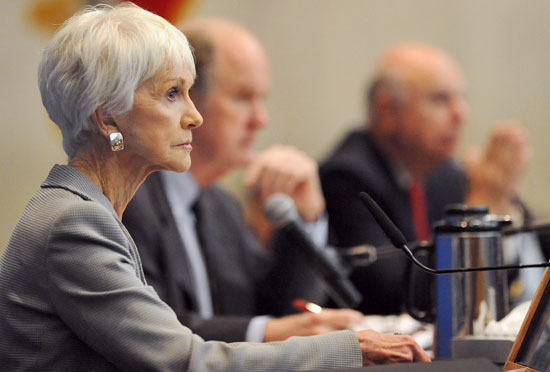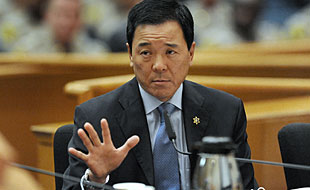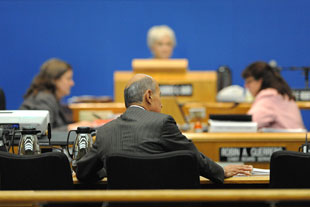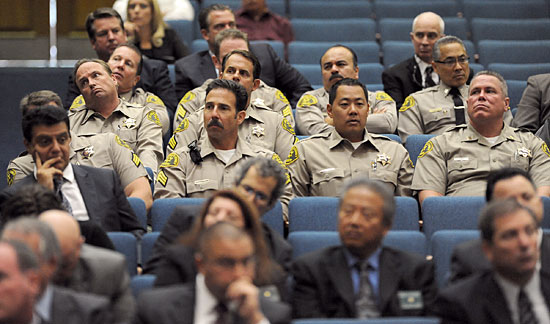Jail panel gets tough
August 9, 2012

Citizens' Commission on Jail Violence members, from left, Lourdes Baird, Robert Bonner and Dickran Tevrizian.
For nearly three hours, members of the Citizens’ Commission on Jail Violence remained silent as one of the most powerful men in Los Angeles law enforcement defended himself against accusations that he undermined supervision in the county jails and helped create the conditions for a rise in deputy brutality.
Under questioning from one of the blue-ribbon panel’s lawyers, Los Angeles County Undersheriff Paul Tanaka said he and others at the highest levels of the department were “caught by surprise” by the force being used inside Men’s Central Jail. He said lower-ranking supervisors had never alerted them, despite a paper trail of alarming internal reports and contradictory testimony from a former jail commander.
Throughout his morning of long-awaited testimony last week, Tanaka also repeatedly said he could not recall details of key events or conversations, including whether he’d ever talked with the sheriff about use of force issues in the jail. “We may have had discussions,” he said. “I don’t remember.”
When the commission’s lawyer had finished his questioning, it was time for the panel members to weigh in. During hearings over the past several months, their inquiries have mostly been aimed at eliciting more details and context—especially from former and current members of the Sheriff’s Department who’ve testified critically of Tanaka and former jail captain Daniel Cruz.
But this time was different.
This time, with a crowd of uniformed sheriff’s officials in the Board of Supervisors’ hearing room last Friday, several commissioners used their questions to dress down the department and its No. 2 man. Although Sheriff Lee Baca would testify later in the day—admitting that “we screwed up in the past”—he was handled more gently, praised for the aggressive measures he’s taken since last fall to heighten accountability and reduce the use of force in the county’s jam-packed lockup.
Not so with Tanaka, on whom both witnesses and the commission have increasingly focused attention.
“I was astounded when you informed the commission that you were not aware of the magnitude of excessive force issues at Men’s Central Jail,” said Dickran Tevrizian, a former Reagan appointee to the federal bench. “It seems to me that…everybody buried their head in the sand with regard to this issue. So it’s very hard for a rational person to understand this.”
“I can’t argue with you,” said Tanaka, who remained largely conciliatory.
Tevrizian also said that after his appointment to the commission, he’d received numerous anonymous allegations from within the department claiming that favoritism is shown towards those considered to be “one of Tanaka’s guys.”
The undersheriff dismissed that contention. “There are people that maybe don’t get to where they believe they should and I’m an easy target,” he said. “I understand that. It’s my position.”
The Rev. Cecil L “Chip” Murray, former pastor of the First AME Church, asked Tanaka: “I wonder if there is any portion of you that might say on the record: ‘I was not always diligent in my performance and the responsibility rests, to a large extent, on me and with me.’”
Tanaka, who oversaw the custody division as an assistant sheriff between January, 2005, and June, 2007, agreed that if he had been “100 percent diligent and looked into every possible aspect of our operation, we wouldn’t be here today.”
Former California State Supreme Court Judge Carlos R. Moreno said he was particularly concerned by revelations that large numbers of uncompleted use of force reports were stuck in drawers or never forwarded to the command staff. This failure, he said, could mean that a deputy’s personnel history might be worse than represented to plaintiffs during the discovery process in lawsuits.
“Do you have any thoughts about what I would consider to be a fraud having been committed on the courts?” Moreno asked.
Tanaka responded that such lapses, which he said are not occurring today, would be “unacceptable and very disturbing.”
Former U.S. attorney and federal judge Robert C. Bonner, meanwhile, questioned Tanaka about the potential impact of openly stating his dislike for the department’s internal affairs bureau—statements Tanaka insists have been aimed at the bureau’s lengthy and sometimes “less than respectful” investigative process, not its vital function within the department.
“What message is sent when a senior manager of a law enforcement agency like yours belittles I.A. in front of line deputies?” Bonner asked. “Well, it’s the wrong message, isn’t it, Mr. Tanaka?”
“It can certainly be construed as the wrong message, and I hear you loud and clear,” Tanaka responded, adding: “I don’t make it a practice of going around and offering negative comments about the internal affairs bureau today.”
“Well that’s gratifying to hear,” Bonner said.
Some of Bonner’s most detailed and barbed questioning centered on a plan Tanaka spiked in 2006 that would have required deputies to begin rotating between different floors in the Men’s Central Jail in downtown Los Angeles. The jail’s captain at the time, John Clark, was concerned about the formation of deputy cliques and unnecessary use of force. His plan had been approved by the jail commander and the chief of custody operations.
Just days after Clark’s plan was circulated, Tanaka said he was inundated with some 200 e-mails, many of them identical, from deputies complaining that proposed changes were unfair to those “who’ve worked years to obtain a certain spot.” Tanaka told the commission that the letters were “a signal of distress.”
In a controversial move that was the subject of earlier commission testimony, Tanaka met privately with the deputies and told them he was rescinding Captain Clark’s plan. Bonner said this action, taken without consulting Clark, “undercut” and “undermined” a captain attempting to tackle serious problems in the jail.
“I don’t consider anything that I’ve ever done in this role or any other as undermining the command of anybody,” Tanaka said. “The only thing I’ve ever done is in the best interest of this organization.”
But as Bonner noted, Tanaka was not even familiar with details of the plan he dumped. The undersheriff testified that he thought the rotation plan called for a change in shifts, requiring deputies to work new hours, potentially creating problems in their personal lives. Clark’s plan called only for a change in work locations.
“And you were wrong, weren’t you? Because it [the rotation plan] didn’t include shift changes,” Bonner said. “You know that now, don’t you?”
“Based on the written documents,” Tanaka responded, “it certainly contradicts what I remember.”
Baca, during his testimony, came to the defense of his undersheriff, calling him “uniquely qualified for this position.” Baca said that Tanaka’s background as a certified public accountant has helped the department navigate its huge budgetary challenges.
“What’s problematic here is that everyone’s to blame and I’ll take the blame for everyone because of my position as the sheriff,” Baca said, but added: “The chain of command, in many respects, let me down.”
Although the commission’s general counsel, Richard Drooyan, tried to get Baca to describe how he would hold those in his command structure accountable, the sheriff wasn’t biting.
“This commission is a great commission, Mr. Drooyan, but you’re not going to tell me how to discipline my people,” Baca said. “I don’t do that in public and I’m not going to do it now.”
Baca also said he hopes the commission will focus its recommendations on ways to improve the organization. “Let me deal with the some of the souls that you might think are a little off base,” the sheriff said. “I can deal with them.”
The commission, created by the Los Angeles County Board of Supervisors last October, will convene again on Friday and is expected to issue a final report in September.
Photos by Scott Harms/Los Angeles County
Posted 8/2/12















 405 bridge work causes a stink
405 bridge work causes a stink
